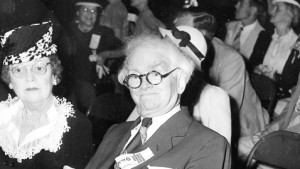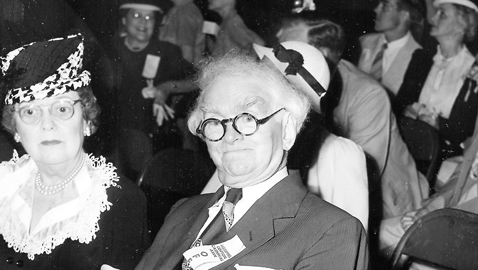By Ray Hil

E. H. Crump at the Cotton Carnival with Mrs. Crump and granddaughter Betty Crump in 1947. From the author’s personal collection. From the author’s personal collection.
By the decade of the 1940s, E. H. Crump, master of the Shelby County political machine, completely dominated Tennessee politics in partnership with Senator Kenneth D. McKellar. Many historians have made the mistake of overestimating Crump’s influence and referred to just about every office holder as a Crump puppet, including Senator McKellar. Crump was oftentimes bombastic, domineering, and highly emotional and his relations with Senator McKellar were complicated. McKellar was himself extremely sensitive and had a dominating personality. Crump was indisputably all- powerful in Shelby County, but McKellar’s own political organization spanned the length of Tennessee. Crump had deferred to McKellar in choosing the candidates for governor and U. S. senator in the 1938 elections and the Memphis Boss, in an age when most communication was by mail, frequently wrote McKellar petulant letters. McKellar’s responses were almost always measured and he was respectful of the Memphis Boss.
Crump also knew that Senator McKellar was highly respected by many thousands of Tennesseans, as well as very popular across the state. Crump was also keenly aware of McKellar’s enormous power inside the Senate and the national government. The Memphis Boss was not above occasional jealousy in his communications with McKellar. Crump habitually used the imperial “we” in his personal correspondence, as well as many of his public statements, which referred not only to himself, but to the Shelby County machine as well.
Wayne Dowdy, a truly excellent historian, has begun using the newly available Crump Papers as the source material for several remarkable projects. The Crump family donated E. H. Crump’s personal and political papers to the Memphis Library just a few years ago, more than sixty years after Crump’s death. Mr. Dowdy has written particularly on the correspondence between the Memphis Boss and Senator McKellar, which encompasses decades.
It was not long before Crump was unhappy with Governor Prentice Cooper, whom he termed “a washout” to McKellar. Crump also kept a close eye on the spoils of victory and wrote Senator McKellar frequently to complain when McKellar’s appointees did not seem to be giving Shelby County its fair share. As the 1940 election approached, Crump grumbled that McKellar’s tight control of Federal affairs and his influence with Governor Cooper meant that appointees were expected to be for “you and you alone”. McKellar soothed the Memphis Boss’s feelings and reassured Crump he would support the entire ticket. Both men loved horse racing and attended racing events together. McKellar urged Crump to come to Washington so they could attend the races.
Crump was soon acknowledging that his complaints had been addressed, to the point where he claimed Governor Cooper had been overly generous. Crump’s correspondence was filled with pithy observations, as well as a host of advice on life. The Memphis Boss lectured Senator McKellar that, “Life is giving – not getting. We get out of it as much as we put in – measure for measure. If we are stingy with our love, labor, joy life grows stale. We must invest if we are to gain.”
Crump, while a millionaire businessman himself, shared with Senator McKellar an intense distrust of Wall Street, corporations, big business and private power companies. When Wendell Willkie was challenging Franklin Roosevelt for the presidency in 1940, both Crump and Senator McKellar were wary of a candidate Secretary of the Interior Harold Ickes had wryly described as “just a barefoot Wall Street lawyer”. Willkie was close to the private power interests and Crump flatly predicted if Willkie were elected, the Tennessee Valley Authority would be gone. Senator McKellar wrote President Roosevelt to say, “You have never had to bother about Tennessee and you will not have to do so this time.” The entire Democratic ticket easily won in Tennessee.
By 1942, Crump was already disillusioned with junior United States Senator Tom Stewart. Crump had little appreciation for Stewart who largely followed McKellar’s lead in the Senate and was relatively quiet. Prentice Cooper was interested in running against Stewart, but opted to seek a third two-year term as governor after Senator McKellar discouraged a Senate bid. Crump had little more affection or regard for Cooper than he did Senator Stewart and he grudgingly agreed to support Stewart for a second term.
Opposition to the McKellar – Crump domination of Tennessee politics was growing and both Senator Stewart and Governor Prentice Cooper drew challengers inside the Democratic primary. Edward “Ned” Carmack, son of the late senator of the same name, ran against Tom Stewart, while former Congressman J. Ridley Mitchell faced Governor Cooper in the primary. Both Carmack and Mitchell ran surprisingly strong campaigns and Crump was horrified when it became obvious that Senator Stewart was running behind Carmack until the returns from Shelby County were reported. Stewart won approximately 43,000 votes in Shelby County to less than 7,000 for Carmack.
Senator Stewart won renomination by just under 20,000 votes statewide and Crump was appalled Shelby County had made the difference. Governor Cooper beat Ridley Mitchell by a larger margin, although if the vote from Shelby County had been subtracted from the totals, the governor would have won by a scant 2,000 votes.
The challenges to the McKellar – Crump rule would become more persistent as time went by.







